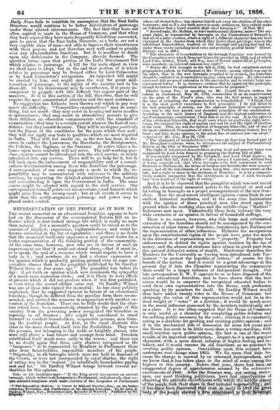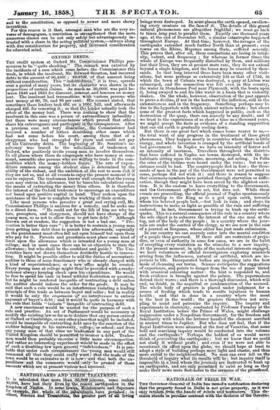REPRESENTATION -OP THE PEOPLE AS IT NOW IS. TKE recent
memorial on an educational franchise appears to have had on the discussion of the contemplated Reform Bill an in- fluence-Which at first looked- Strange but which is really no more than natural. Not a moment's question could be raised as to the tunount of intellect, experience, highmindediiess, and social in- fluence embodied in the list of signataries ; and there is no doubt that the memorial itself only expresses a very general desire for n betierrepresentation of the thinking portion of the community. At the same time, however, men who are in favour of such an improvement, see that it could not stand. alone,—t]iet it Must be so to epealc,- the soul of a ineasuie which would require to have a body to, it;' 'and nowhere do we find a clearer -expression of the opinion n. which is gradually gaining ground even in some con- servative classes than in the pamphlet published by Sir Eardley Wilmot three or four years ago.*, The Pamphlet was before its day : it set forth an opinion which now, commands the sympathy of a much more numerous circle ; and it is likely to have effects at present which it did not produe,e when it was first published, or even when the second edition came out. Sir Eardley Was one of these who signed the memorial ; he has sinee public/y explained, that he su rted opinion in favour of an educational franchise, though he _ered from the peculiar form there room:- mended, and advised the measure in conjunction with another ex- tension of the franchise. There can be little doubt that the char- ters which have been successively obtained by the people of this eottntry, from the governing power recognized the franchise as reposing in all freemen ; who might be considered to stand forward as resident householders, responsible persons,, Men form- * ihe xesicleg people. At first, in the rural districts this class in the xitana resolved.itself into the freAolders. They were the persons, not belonging to the noble or knightly classes, who were still above a base tenure and exempt from bond: Freedom istablished itself much more early in the towns; and there can be n.o . doubt again that those early charters recognized as the qbtergessie " to be represented, by Members in Parliament these who ..were householders, responsible members of the people. a Originally,: in all boroughs which were not held in de,mesne of the Crown, or were not incorporated by royal chartO, the right yoting was in the 're/shalt ' (or inhabitant) householder paying se4 and lat." Sir Earelley Wilmot brings forward several an- triniities fel. this opinion.
Coke in his Institutesisays," If the KimaLleenj•ilty incorporate an ancient borough, which hdforeisenthuintolli Midigrunteth, that eer- tfialeitedS1024Kofficio ,44140:PikkethP4Oli:Pf 14OAorgeffeo of Por4810!* e-rf*itionsAlray.J241prtni7,14.•-'14.teek tiatikanti ssettenfiEsq.; on the Itedis TAW; ae‘r)o tni I ?I'll eti II! la;
44 Ulu mishit!. ir,John B.
where all elected bet/ore, this charter taketh not away the election oft4S.other burgesses; and so if a city hath power to make ordinances„ they china make an ordinance that" lesser nuntheirahiillnleet hurgeesee."' (421initi'48.) 4' Accordingly; Mr. Hallam, in .hisConstitutionalMjstor,y; *y*4.4 The ori- ginal right,. as represented by, begone* iii,the,Parliamentthf Edward I, and all; ef .4 1,a4r creation, whe..ren 411t,ofIdiffsreut e.lAR!terlips.pot, been inhabitant householders, resident Ur- the brofigh tbievt! g nha tot, eXpressed in the charter from which,fhey ,ertys tlfeir„_peritl egyymin the under those words including local rates and probably '(Oenet. ,History, vol. id. 200.)
" The admission of householdiiii to thehOrefigh franchise was termed by
the Committee over which Sergeant qtanville presided a Lord C4-..e, Selden,:Pinch, and Noy, men of known Mtitirrehica rinCiplee,
inA64, letwhich
*ere Members, an inherent e4nnnion'kw right." ' Y'Before Ide. Pitt brought in hisbffl in 1785; he-had' subniittellteet(ain .proposala for reform in Parliament to Mr, Wyvill ; among whiGhwari quo to the effect, that in the now boroughs proposed to 4 preated,ithlifranphise should be conferred on householders paying ratercand taxes. He afterwards narrowed thie proposed extension to the metre) and to certain Lute un- represented towns. It is however,. evident that he•approved -the principle,
though helimited its application in theineaeure he proposed." • ()harks James Fox, in speaking On Mr. [LordYBrrey's motion for
reform in -Parliament, May 26, 1792, oommended ha- as an imerivenient on the plan of Mr, Flood's plan., who vraa the first peeson„.to. gest the idea of extpding the representation to householders. .4, I thin that it is the Mast .erfeet 'recurrence to first principles. I do "nOt 'Milo the first prineip es of society, nor the abstract' principles' of representa- tion, but to 'the first known rind tecOrded- principles of war oohstitlitiotn.• According to the early history of En and e highest outhorattes_911
our Parhainefitarv constitution, Ifind te be the case. It, the opinion
of the celebrated 'Glanville, that in all cases where no particular right inter- venes the common law right of payingscot and let *he the right *of election in the land. This, sir, was the opinion of Sergeant 4.1L1nVille and of one of the most celebrated e.i■minittees of whieh our Parliartientary'listory has to boast ; and this,.in My opinion, is the safest line of conduct you can adopt." —Speech of Mr. Fox' May 26, 1792. . .! The admission of householders to the borough franchise formed part of Mr. Brougham's scheine when he introduced the subject Of Parliamentary Reform on the 13th of November I830."• •
The right Of inhabitant householders Raying. local and general taxes was recognized by Lord John Russellin,prepotung, the Reform Bill of 1831.
It was equally recognized by Mr. Campbell, now Lord Chief. Justice, in debate upon that bill, July 5, 1881—" As a lawyer I maintain, withont fear of being Contradicted, that ivhen boroughs were first summoned" to send Members to Parliament, the terms of burgess and houbeholdet-iteinsynony- Mous and all the inhabitants of a town being free, who were sivern'at the lest, bad aught to share in the elections of, Members. It isdipaccompara- tively modern usurpation that the inhabitants at large of such boroughs have been deprived of the right of voting." And it is to he observed thatthe.pamphlet which was sent round With the educational memorial' points to the revival of scot and lot voting in boroughs as a proper.accorupanimeat of the new fran- chise. Rare the most recent intelligent opinion comesback to our earliest historical institutes, and at the eame, time harmonizes with the Opinion of those practical men who stand upon the ound where the Working class and the middle-class "Radical" orniers now meet. Undoubtedly these facte :indicate the very wile extension of an opinion in. favour of household, suffrage.
There is no reason however i why thin large and. aabstantial extension of the franchise should net be Accompanied by the eon-- struetion- of other. forms of franchise, introducing into _Parliament the representation of other influences. Ilithera: the, usurpations 'Ton the constitutional rights of the people, have gone 4mm:fault in the direction of representing mere " property." .Breperty, has endeavoured to defend its rights against rees,tion .by,fhe. use of money, and the.abuses.at elections have arisen, in .great part from this natural .deferisiye.action of steo,lth., riilackstome deseribes the Members for the University as having been introduced, into Par- liament " to protect the republic of letters," of bourse for the benefit of the nation. Audit Would be a great. advantage at the present day if into the Chainho, representing the;
community there could be a larger infusion of independent thought:„
late correspondent E. W. F.' appeara.to us to have disposed of the mixed- educational franchise, and to have shown that the beat course would be to empower the recognized ednested. bodies to send- their QW11 representatives into the House, each, profession. speaking by its. members for itself. Pax Zardley Wilmot, would ;thus have added twenty votes to the House of C0111731CO3: but obviously the: value of this 'representation would not lie in the dead weight of "votes" a division; it would lie much more in the moral iniluence pa:seemed by the Kneutherajudiviitually id as a class. It is too. .often supposed that the House of Ciattemne is only useful as a chamber for .eompleting public debates and fer.settling public measures by the vote, whgnas it is censtantly acting as.a machine. for guiding anctereating public opinion ; :and if in the ,naechanical tide of disoussion ..frgitahr. lieWjaars past the House has eunk to be little- more than A voting-TIP:Plaine., with small reaction upon public opinion, the fact is one of:AA:typist results of its imperfect esostilintion„ dmpart,to,it Avoca:order eharacter, withia, more direct :Antiiitie.4 Mgilki !apfl felleeti and it.11'9.904- resume /f4,4 ssaa.gssiatant in 41 4!34544.11
cref44W, PuNia. Opinion- QeMiabliBlaIMPenelhiCaltb.joet We.
undergone isrist efiange sinee Ne;,fit4ifnpnitutluit date ht.., cause the bhtinge is avowed y.an eatee okeesperuhenta end: we know thAt it has taken Ehane.in e.ijgcsonie;aniringtba: highest in this, country. . kleforo itht4..aqiirilltbist*chASid- borgt(Al. exaggerated degree of_appreheo,tion.pronaed by the subversive it Tjtritcs,.. 14 (' .1
men, our Oat' nig. , have ha
excitementaef:848. ,'Aftor )Tiyomitin„..inTsir. afxiçC oliseryi
40 t
ot"t4. 'OA txteil .01,11 , and to the constitution, as opposed to newer and more showy inventions. tor this reason is it that, amongst Who are the very re- verse of demagogues, a conviction is :strengthened that the more numerous classes can be not only- safely bat advantageously in- trusted with a share in the acting p011tleit,Ptyptem,always along with due consideration, for property; ACTnereased 'consideration for educated mind.



























 Previous page
Previous page